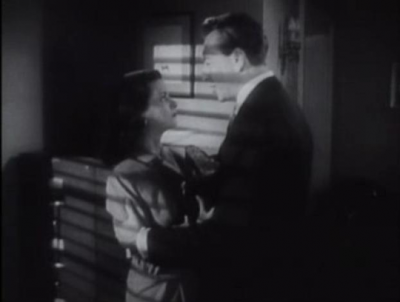A Shriek in the Night (1933)
Starring: Ginger Rogers, Lyle Talbot, Purnell Pratt, Harvel Clark, Lillian Harmer, Louise Beaver, and Arthur Hoyt
Director: Albert Ray
Rating: Seven of Ten Stars
A series of murders take place in an upscale apartment building, and reporters Pat Morgan (Rogers) and Ted Kord (Talbot)--working for rival newspapers but involved in a romantic relationship--are hot on the trail of the killer, or killers. Morgan happened to be working on an investigative piece about one of the victims, so she is in a perfect place to help both her career and the police... so long as she doesn't end up a murder victim herself.

"A Shriek in the Night" is, for the most part, a fairly typical early 1930s low-budget mystery, with dimwitted maids, cranky police detectives (although in this one the detective is not incompetent, just cranky), and wise-cracking reporters running circles around everyone and ultimately providing the clues needed to solve the mystery. The acting is above average here, and the characterizations of the two reporters and the police detective are also a bit more intelligent and three-dimensional than is often the case in these movies. (The comic relief maids are still as annoying as ever; if this is what American-born house-servants were like, it's no wonder we took to importing illegal aliens to turn down our beds and clean our homes!)
What really sets the film apart from others like it is its villain, and a surprisingly chilling sequence where he prepares to burn Pat Morgan alive. This character feels in many ways like an ancestor to the mad killers who came into vogue during the 1970s, and which continue to slash, strangle, and mutilate their way across the movie screen to this very day.
Another thing I found interesting in this film is how different Ginger Rogers' character was from the one she played two years later in "The Thirteenth Guest".
Many actors and actresses that appeared in these B-movies gave pretty much the same performance in movie after movie--for instance, there's very little difference between the smart-ass character Lyle Talbot plays here and the one he played in "The Thirteenth Guest." I haven't seen enough of Rogers' performances to really know why there is this difference--was she lucky enough to have a chance to show different facets of her acting ability, or did she make each part she played different somehow?--but it was an unexpected surprise.
Those of you out there with more than just a passing interest in suspense and horror movies may want to check this film out for its very modern, proto-"maniac killer" character/sequence. Those of you who just enjoy this style of movies--mysteries that get solved by wise-cracking reporters who take nothing seriously--should also check it out. It's a fun way to spend an hour.






